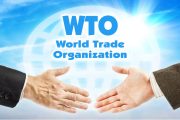
Biologist and ex-professor Bret Weinstein was first targeted when, in 2017, he refused to comply with a request that he and other whites should leave his college’s campus for a day. More recently, YouTube demonetized him for being skeptical of COVID genetic-therapy agents (GTAs, a.k.a. “vaccines”) and advocating ivermectin and hydroxychloroquine for preventing and treating the disease. Despite this, Weinstein apparently subscribes to the maxim “Never attribute to malice what is better explained by stupidity,” as he interprets the obsession with pushing the GTAs as part of a “noble lie” gone wrong.
Weinstein’s take, expressed on The Joe Rogan Experience podcast, was covered Thursday by American Thinker’s Peter Skurkiss. It’s an interpretation that certain people may view as a bit naïve; remember, however, that a cause often includes many different individuals and groups that may all work toward the same end, but for different reasons (more on this later).
Skurkiss points out that when a viral disease is raging, health authorities may decide that the ideal solution is to vaccinate the majority of the population in an effort to achieve herd immunity and eliminate the pathogen. But enter game theory:
While health authorities consider vaccination an imperative, many people will refuse to take the medication for fear of side effects. Skurkiss then writes:
In Weinstein’s hypothetical example, the non-vaxxers are relying on others to assume the risk of vaccination while they “free-ride” on herd immunity. But if enough people free-ride, the desired threshold of the vaccinated is never reached. To counter this, the health authorities feel they must do what they can to get as many people vaccinated as possible. This includes using blatant falsehoods and scare tactics. The authorities feel justified in lying, putting out misinformation, and censoring opposing views. It’s all for the common good, they tell both themselves and their political master.
Deception like this can fall in the category of the “noble lie.” A good working definition of a noble lie is that it is an untruth deliberately propagated by the elite to maintain social order or to advance an agenda. With the current Wuhan virus pandemic, the noble lie is looked at by the powers that be as a prerogative of the government and public health officials to be employed in emergency situations. Even if you accept that for the sake of argument, Weinstein notes a further problem. The entire premise of a noble lie falls apart when outside interests have captured the institutions of public health and use this prerogative to deceive to advance their own selfish agendas unbeknownst to the public.
(Also citing this phenomenon is a medical doctor named Keith Jackson. He wrote just yesterday that “we can’t be allowed to have alternate treatments, apparently because the narrative of the left may get undermined in the eyes of the voters, the ‘Noble Lie’ being more important than our health.)
Call them useful idiots if you will, but these “noble COVID liars” certainly exist. Note here that while people like adopting simple ways of understanding the world (e.g., “Everything is about money!”), man’s nature is complex.
First, and again, different people pushing the same cause can have different motivations. For example, consider scientists, military brass, and politicians all working to develop new technology. The scientists may be driven mainly by intellectual curiosity and vanity and a desire to be seen as great inventors, the generals by a desire for the technology’s weapons applications, and the politicians by a desire to build a “legacy.”
Second, multiple motivations can exist within the same person. For example, a doctor can be driven by a desire to heal the sick, the goal of making money, and the ego gratification his title brings.
As for COVID, it’s pretty apparent that there are megalomaniacal politicians who relish the power the situation affords them and the fact that it enables them to promote other agendas. (Canadian prime minister Justin Trudeau did say, before the United Nations last September, that the “pandemic” provided the opportunity to advance what they were working on prior to it: an economic “reset.”)
Yet some may now ask regarding COVID, if certain people really do have good intentions, why do they irrationally push GTAs of questionable safety and efficacy and demonize promising medicines? The answer is that man, no matter his education or station, is too often governed by emotion and not rationality.
Remember here that it’s human nature to seek meaning in life, to gravitate toward a cause — and that cause will often get deified. A good example is how when confronted years ago with arguments refuting his ideology, a Marxist might simply and dogmatically respond, “That’s not what the party says!”
In fact, forget causes; this phenomenon is evident also in fan-boy fanaticism. That is, when people truly idolize a politician or even a sports figure, it’s not just that they respect the person immensely as a person, with flaws and failings but also triumphs. Rather, they’ll often behave as if the individual is infallible in character and won’t brook even rational, reasonable criticism of him.
Add to this the related factor that man is highly prone to rationalization, which means here that he’s very good at convincing himself his lies are noble even if they’re actually damaging, and it may become clear that in many cases we really are dealing with Branch Covidians. To use a variation on an Upton Sinclair observation, it is difficult to get a man to understand something when his salary, fame, self image, or power — or anything he cares about more than Truth — depends upon his not understanding it.
As for factors encouraging COVID rationalization, Skurkiss writes that “Big Pharma and other outside money sources like the Gates Foundation [and teachers’ unions] have unduly influenced (corrupted) organizations like the CDC, the FDA, and the WHO.” This is likely just the iceberg’s tip, too.
Put simply, in addition to the deceived, there are also the deceivers. The latter may be much smaller in number, but they wield great influence — particularly with an uninformed, fearful population. The bottom line is that compared to believing 2+2=5, a claim now actually being made, believing that a risky genetic-therapy agent is a “safe and effective” vaccine is small potatoes.




